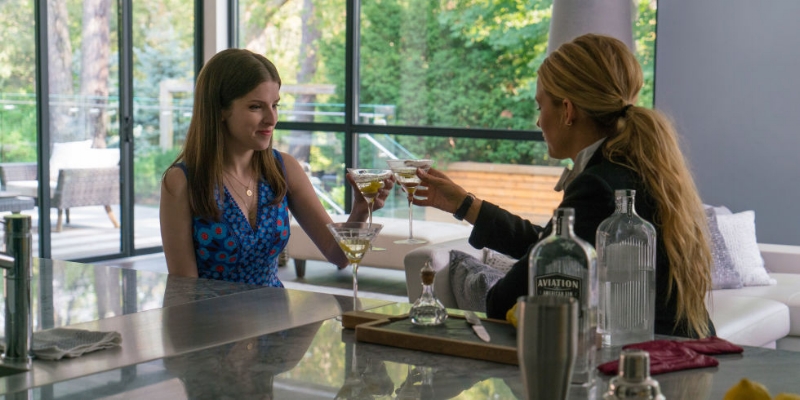Directing: B
Acting: B
Writing: B
Cinematography: B+
Editing: B
It's astonishing that Crazy Rich Asians is the first American film with an all-Asian principal cast in 25 years. The Joy Luck Club was released in 1993; I was 17 years old, and went to see it with who would later become my sister-in-law, while my brother and his friend saw Dazed and Confused. What's even more jarring is the realization that even having been released that long ago, The Joy Luck Club is a far better film than Crazy Rich Asians.
Of course, even comparing them is unfair: just because they both had all-Asian casts doesn't make any less like comparing apples and oranges. They are two very different movies. Crazy Rich Asians has to carry a weight of cultural context that it neither needs nor desires, but here we are. If we lived in a world where lots of movies by and about people of Asian descent were made, Crazy Rich Asians would just be another throwaway comedy romance, pleasantly enjoyable and easily forgotten.
Instead, it faces acute criticism for the "diversity of Asian experience" lacking in its representation. What the hell do people expect about a movie about crazy rich people, of any ethnicity? Obviously following the stories of the obscenely rich is not going to capture any "diversity of experience." If done right, though, it can still be fun.
Some of the debate, particularly between Asian audiences themselves, can be illuminating. For Americans regularly engaged in conversations about white supremacy, it's a bit of a surprise to hear the phrase "Chinese supremacy," in the context of insisting Crazy Rich Asians is not as progressive as some want to regard it as, even if it is groundbreaking in a lot of ways. I knew nothing about apparent oppression of non-Chinese minorities there, or that South Asians are commonly relegated to service industry work and discriminated against. As someone with a spouse born in India, seeing reference to that caused me to go into this movie looking for that representation in a way I almost certainly wouldn't have otherwise. And? There is one scene in which two friends pull their car up to a huge mansion, and manning the gate are two clearly South Asian men, perhaps Sikh judging by the turbans, and they exist only as a punch line: given no lines, they startle the young women by looking imposingly into their car windows while carrying bayonets. They are, indeed, reduced to caricature.
What a curious thing to notice in a movie featuring not a single white actor with actual lines, the few seen only extras. This is how regarding what it all means that this is a truly rare movie with an all-Asian cast can be misleading. Nevertheless, there is no denying that, of course, representation matters. I felt that watching this movie, just as a gay man: the only thing I have in common with the cousin who refers to himself as "the rainbow sheep of the family" is that we're both gay men, but I still loved his inclusion -- it made me feel, at least on some level, seen.
And so it goes with many Asian audiences at Crazy Rich Asians -- more specifically, no doubt, Chinese audiences. This "crazy rich" family consists of Chinese Singaporeans. However flawed the movie is -- and to be certain, it is far from perfect -- certain people being excited by its very existence is not difficult to understand.
I have also seen the complaint that these Asians aren't particularly crazy, which is frankly a dumb observation to make. Perhaps they are not "crazy + rich Asians" so much as "crazy rich + Asians." A strangely pleasing thing about this movie, and perhaps an accomplishment of director Jon M. Chu (working from a script by Peter Chiarelli and Adele Lim, based on the novel by Kevin Kwan), is how even though Crazy Rich Asians revels in the opulence of its characters, its presentation is never obnoxious or tacky.
It's really just more of a backdrop, for a cast of characters, whose range of dimensions vary widely, as do the performances. Which brings me to one of my own primary issues with the story. The central character is Rachel Chu (Constance Wu), the young woman who has been dating Nick Young (Henry Golding) for a year but has no idea how rich his family is, until they fly first class on their way to a friend's wedding in Singapore. How dumb is this woman? Much later in the story, a Young family elder tells her she's "clearly a very smart woman," and I just thought, Is she? And that is not a criticism of Rachel the person, but rather how she is conjured in the script. She has to be insanely naive in order for this Cinderella story to work.
And that is the story: Rachel is broadsided by Nick's wealth a year into their relationship, and then goes to Singapore to face suspicion and withheld acceptance from Nick's family. Michelle Yeoh is memorable as Eleanor, Nick's mother giving her the cold shoulder. And as much as some might claim the story is so bland it could be switched to any cast of white Americans and be rendered nothing special, that ignores contextualization. There are many details of Chinese culture and tradition, even with a fascinating infusion of Western influences: a lavish wedding party features swing dancing; a scene of trying on high-end dresses features a Chinese version of Madonna's "Material Girl.". There's a lot of blended influences here, resulting in a truly unique point of view. Granted, much of that point of view is being so filthy rich that there's not much sense of the real world, but whatever. Sometimes you take what you can get.
The best anyone can hope for, really, is that Crazy Rich Asians opens some doors, which have all been closed for, insaely, two and a half decades. It's preposterous, and yet largely true, to think such a turn of events depends on the success or failure of this one movie, which is merely a pleasantly diverting romance. It's also occasionally pretty funny, especially any time Awkwafina, who plays Rachel's college roommate and lasting friend, is onscreen. She provides much needed levity amongst the romance and understated if contrived family drama, and the movie would be much worse without her.
So would I recommend it, then? That's the question I struggle with most. Under different circumstances, based on the story alone, I would not regard Crazy Rich Asians as special enough to tell people it needs to be seen. Unfortunately, a lot is riding on this movie, thanks to the predictable shortsightedness of Hollywood dipshits. So: everyone should buy a ticket and see Crazy Rich Asians, so more, better movies featuring underrepresented communities will get made. And after that, I promise I won't ask you to see any more blandly ordinary romances. I mean, unless you're into those. In that case you'll love this movie.
I did find myself having a good time in spite of everything, after all.










